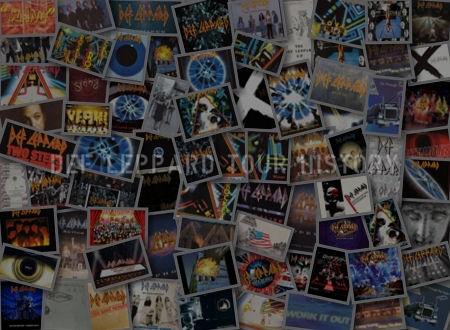DEF LEPPARD INTERVIEW
November 1987
"I used to write imaginary reviews of gigs instead of English essays."
An interview originally published in 1987 and published during the early part of the 'Hysteria' US tour.
Up From Steel Town: The Def Leppard Story
Def Leppard is the British version of The American Dream: five working-class kids who achieved mega-fame and fortune while still in their very early twenties. But as many dreams go, theirs also included a tragic surprise - and now, it seems, a glowing comeback.
With their new 'Hysteria' LP firmly entrenched in Billboard's Top 5 at press time, and a major tour slated for kickoff at the end of September, the band's troubles seem to be behind them at last. But the hard times were harder - and the successes greater - than anything the young rockers could have possibly imagined when they were starting out.
Sheffield, England is a grimy town with one industry where most people's ambition is simple: you work in the steel mills, or you do everything in your power to avoid it.
Vocalist Joe Elliott decided his path at age five, when he heard the Beatles.
"When I was in school, I used to write imaginary reviews of gigs instead of English essays," he admitted once. Art class was taken up with making posters for an equally imaginary band called Deaf Leopard. As for career counselling, Joe told them he had it all figured out; he was going to be a rock star.
In another part of town, bassist Rick 'Sav' Savage was apprenticing as a British Rail technician when he and original Def Lep guitarist Pete Willis formed Atomic Mass in 1975, playing Thin Lizzy and T-Rex covers. Def Leppard was born when Elliott replaced the group's first singer and convinced the other to adopt his old fantasy band name (the spelling was changed when Deaf Leopard confused audiences who thought they'd be seeing a punk band).
Guitarist Steve Clark joined up next; he'd been knocking about in music since age 14, when he made his debut at a London club called the Local Hut. Rick Allen started playing drums at age 10. By the time he was 11, he was already with a band he admits was 'the worst' Smokey Blue. He joined the Leps - whose original drummer seemed more interested in his girlfriend than in practising-after seeing a newspaper ad that read, "Leopard loses skins."
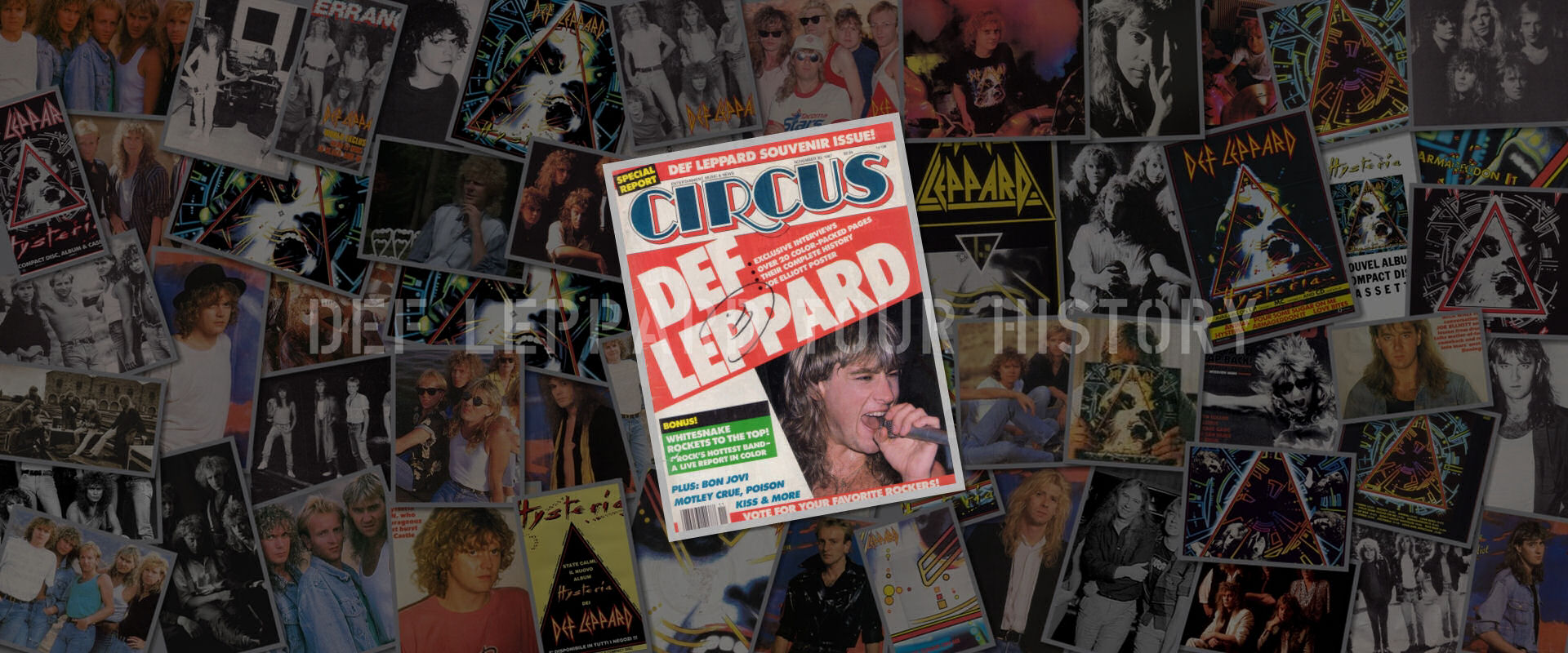
The group rehearsed in a room atop - what else - an industrial steel works factory, climbing many flights of stairs with their equipment. Def Leppard's debut gig was in 1978 at the Westfield School in Sheffield. They were paid five pounds (around $9.00), though their usual fee during this no-budget time was free beer.
Inspired by the do-it-yourself attitude of the then-hot punk movement, Def Lep released their first EP, Getcha Rocks Off, in 1979. The label was their own Bludgeon Riffola (the name comes from a description of their sound in a very negative review the band received opening for fellow Sheffield up-and-comers, The Human Leaque). Elliott's parents - who'd gotten over their initial "get a real job" phase - lent them $900 or so to press the first 1000 copies, many of which were sent to record companies and radio stations. The album cover was all done at the printers where Rick Allen's mother worked as a secretary.
And it worked. Andy Peebles, a DJ for the powerful Radio 1, played the record and it took off, eventually selling 25,000 copies and making the British Top 100 - an amazing feat for a self-produced indie. In August, 1979, the band played a showcase for record company scouts at the Lafayette Club in Wolverhampton. Also in attendance was manager Peter Mensch, who saw the band's potential and was immediately determined to work with them. His first official act was to book Def Leppard on AC/DC's English in November, 1979.
All around, metal was beginning to get fashionable again, and Leppard, along with Iron Maiden and Motorhead, were the leading British contenders. They signed to Phonogram in England (Polygram here) and released 'On Through The Night' in 1980. While the LP didn't exactly set the world on fire, it eventually went Gold on the strength of it's successors. But it did have a song, "Hello America," the band's fantasy about touring here. And though their British fans didn't take too kindly to Def Lep's focusing on stateside success (to this day, the band is more popular in the US than in their native country), this was one band whose fantasies came true. In the spring of 1980, Def Leppard hit America - first briefly with Pat Travers, then on a triple bill with the Scorpions and Ted Nugent.
Def Leppard's first collaboration with noted producer Mutt Lange, 1981's 'High 'n' Dry', brought new triumphs. The LP made it's debut at the same time a fledgling video station called MTV was coming to life, and the two hit it off immediately. Leppard's "Bringin' On The Heartbreak" video caused High 'n' Dry to gain new life as it was starting to fall off the charts; the album ended up Top 40 and platinum. In the meantime, Leppard opened for Rainbow and Judas Priest in Europe, Ozzy and Blackfoot here.
But the band was still a family affair; tour managed by Rick's older brother, Robert Allen, the young metal stars still lived with their parents when off the road, and frequented the local pubs (where Joe Elliott, Snr took to showing off press clippings about his son). Though the group was already known for it's love of brew, one member took it a little too far. Once Def Leppard went back into the studio to record 'Pyromania', the consensus of opinion was that Pete Willis' taste for hard partying was interfering with the group's work. Enter Phil Collen, recruited from British glam outfit, Girl; he fit in immediately and became especially tight with Steve Clark.
The band had high hopes for 'Pyromania'. They'd worked hard on it, save for taking time off from recording to watch World Cup Football on TV. "I could bullshit you and say, 'We're going to be the biggest band in the world,' but I know we're not," Elliott said back in 1981. "We'll never be immortalised, but could be one of the biggest in that period of time." That proved to be an understatement.
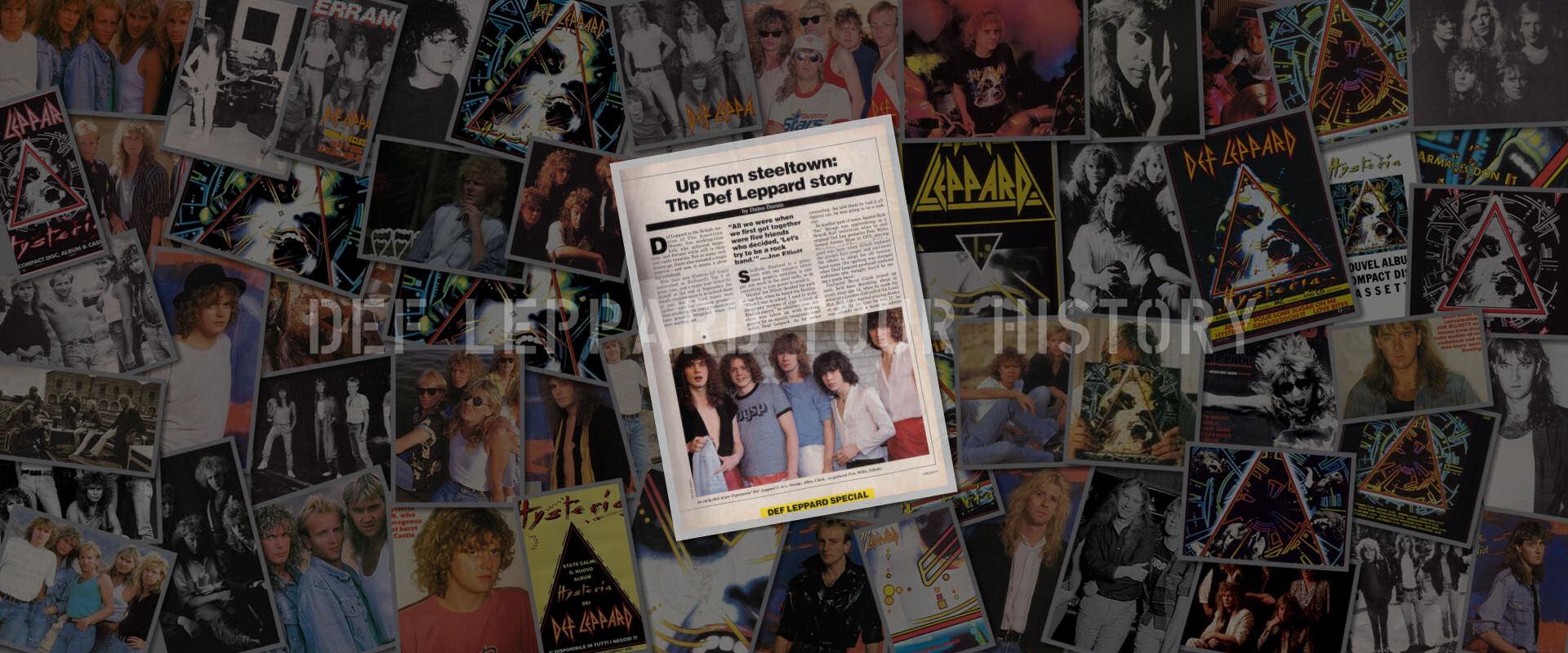
Pyromania was the Slippery When Wet of 1983. The LP, again produced by Mutt Lange, was second only to Michael Jackson's Thriller on the charts, eventually selling more than six million copies and spawning three hit singles, "Photograph", "Rock Of Ages" and "Foolin'" The Gallup Poll in that year listed them as the most popular band in America. At Circus, Def Leppard swept the 1983 Readers' Poll, winning nearly everything including Best Group, Album, Male Vocalist, Drummer and Video.
Everyone, it seemed loved them. Their good looks attracted women to the previously mostly-male heavy metal scene. People magazine did a story about them. Even critics who began their reviews with virulent put-downs of metal in general thought Def Leppard seemed a nice bunch of chaps you could introduce to your mom.
"We never wanted to look like tramps," Elliott told Rolling Stone in '83. "We're very working class, but you've got to have a certain amount of self respect."
That memorable year, Def Leppard headlined in the US at last, with Krokus and Gary Moore opening. Overall the tour was a success, though Elliott did develop some vocal problems, causing him to change the tour name from Rock Till You Drop to Rock Till You Die. In a properly spectacular finish, Elliott flew his parents to California to see the group's performance in front of 15,000 people.
Tour over, the band got ready for their follow-up LP. They were anxious to get back on the road as soon as possible: playing live seemed "the only thing that's really worth it," Elliott claimed once. "I don't like making records. It's boring."
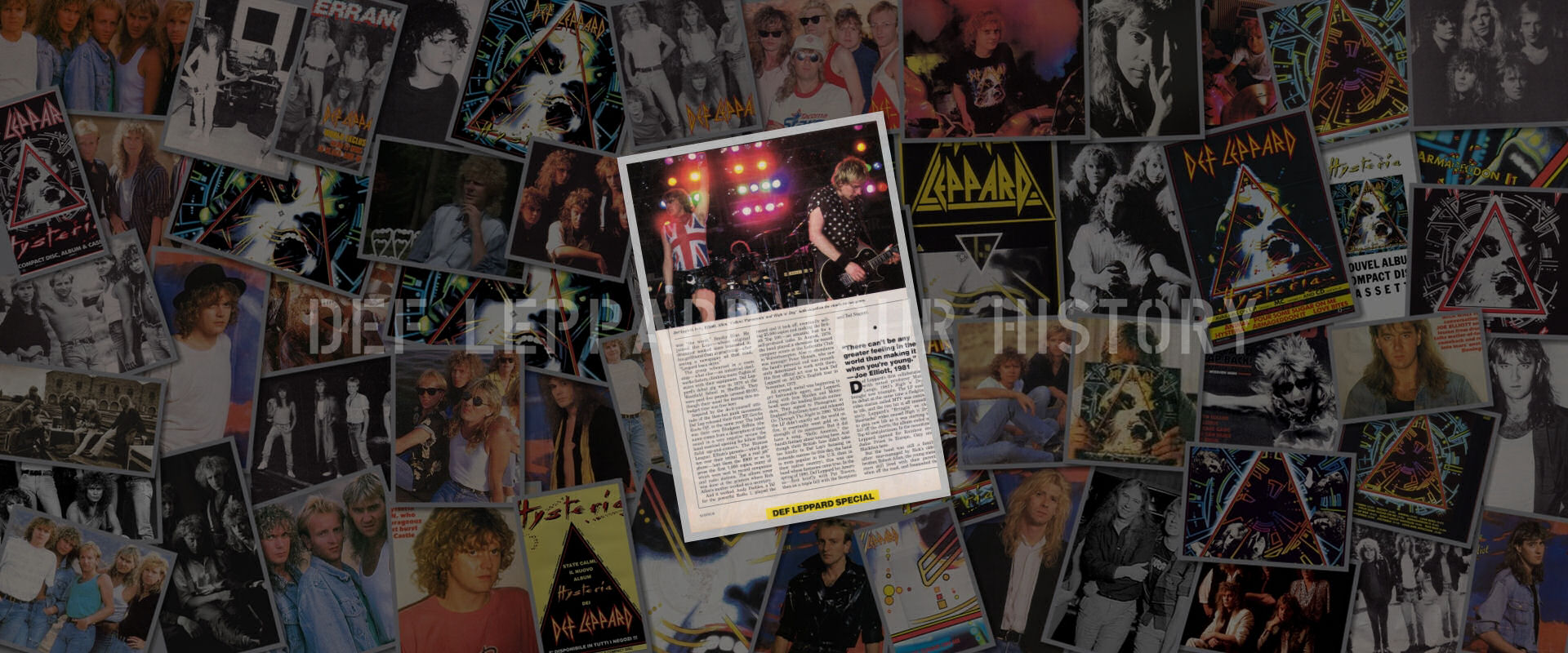
On New Year's Eve, 1984, Rick Allen and a female passenger were on Rivelin Road in Sheffield driving to his parents house, when his Corvette went off the road. Allen underwent a 10-hour operation at Royal Hallamshire Hospital to re-attach his arm, which had been torn off at the shoulder, but 24 hours later had to be amputated because of an infection.
"I was in a real state like a zombie," says Elliott of that disastrous time. "My mum and dad were with me - my dad put his arm around my shoulders and gave me a whiskey. They've always been very supportive."
But he also credits the experience of success and touring for giving the band strength to go on. "It prepared us for any shock," he explains. "When I got that phonecall from Peter Mensch (about Rick's accident), I was devastated, But the day after I was okay. We were well prepared to deal with our lives after it happened. We accept things now - that things happen the way they do; you just have to make the most of it."
A more ruthlessly ambitious band might have replaced Allen immediately, but the Leppard's didn't even consider it. "You have to ask, would I kick my brother out of the family if he lost an arm?" says Elliott. "The obvious answer is, no I wouldn't. So with the band, it's the same thing."
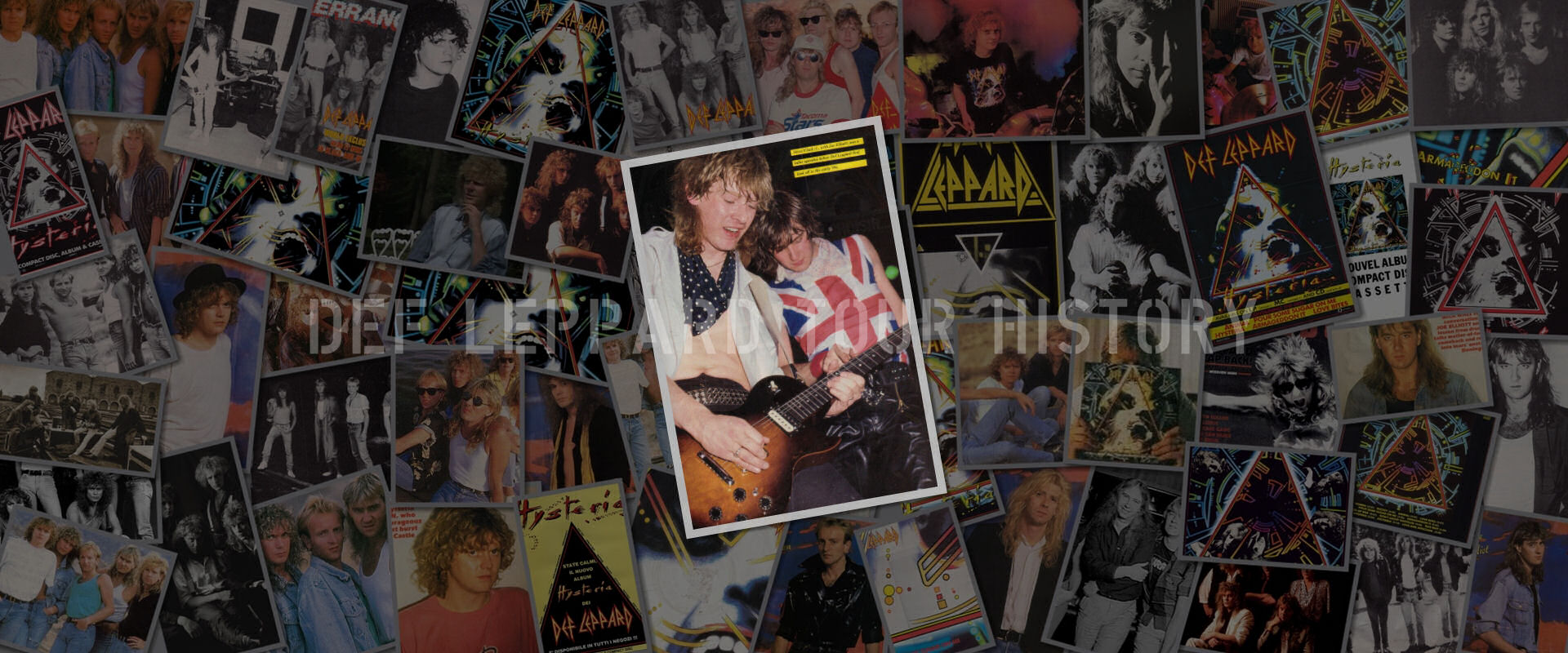
Luckily, Allen was already exploring the wondefful world of Simmons drums, so it was a natural step to take the concept one step further.
But if all this wasn't enough, a number of less serious mishaps delayed the recording of Hysteria again and again. Mutt Lamge became unavailable. Replacement producer Jim Steinman drove the band crazy. Joe Elliott got the mumps. Self-Production didn't work out - and all this was interspersed with "nine or ten months of lethargic nowhereness," says the vocalist.
But Mutt Lange's return to the proceedings at Holland's Wisseloord Studios got things going again, though not exactly quickly. "Yes, he has a reputation for being picky," says Joe of his perfectionist producer. "And he is picky. But that's why he's the best."
In 1986, Def Leppard tested their wings with a mini-tour of Europe. While a second drummer was added at first, he was pronounced unnecessary after only four shows.
Now, the band is finally back with a vengeance, though in the meantime, many groups (including their opener, Tesla) have picked up on their sound. Is it a good time for their comeback?
"It feels weird when you say 'comeback'," says Elliott. "I'm only 27 years old. We had a four year break, both self-imposed and forced upon us by circumstance," A break that seems to have only increased their determination. Declares Elliott, "We can do anything because we're a family unit. We like to think of ourselves as strong enough to withstand any fluctuations in the music business. And I honestly think that, no matter what the music trends are - a good record will always be a good record."
By Daina Darzin @ Circus 1987.
related pages/releases
explore def leppard tour history



